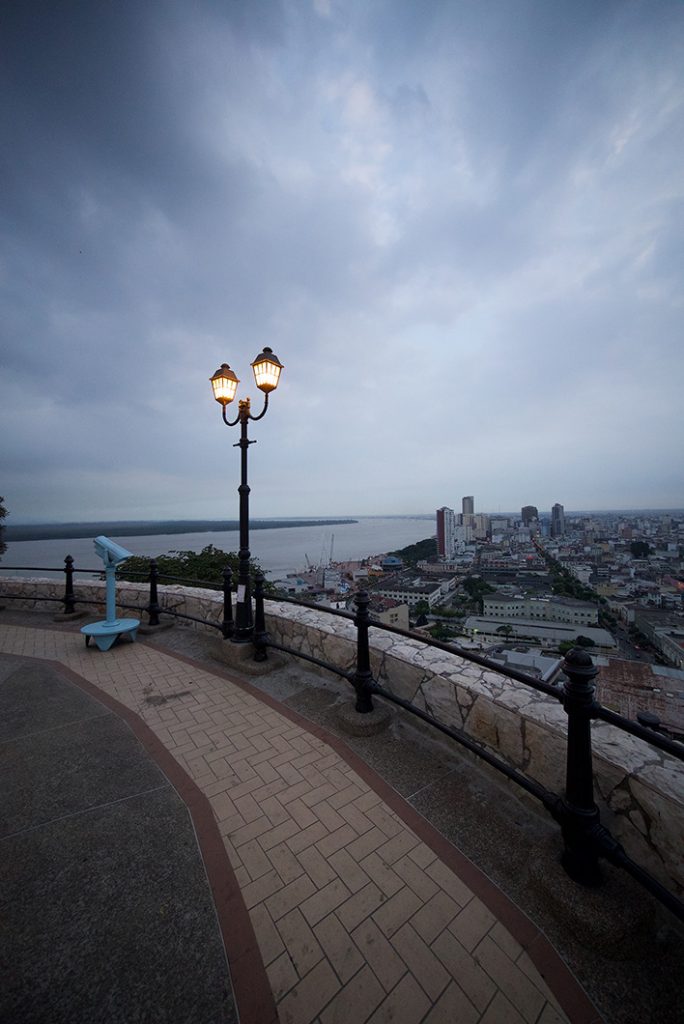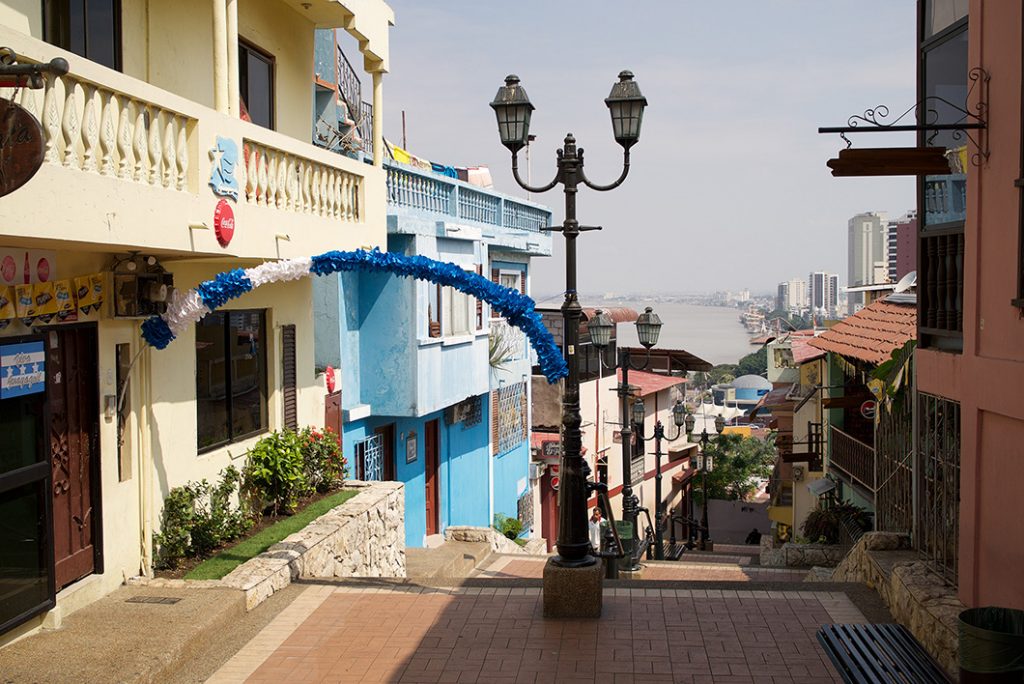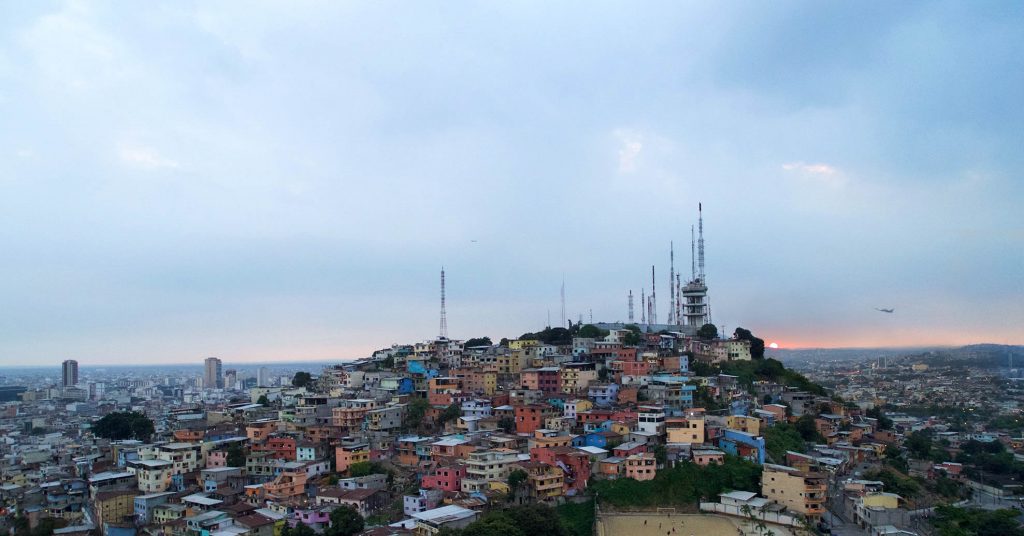From Guayaquil to Montañita and into the Great Unknown
The cab raced through the darkened streets, pausing only now and again to roll one way or the other to avoid a pot hole or swing around a traffic circle. It was 2 AM, and almost every storefront lining the street was dark, their metaled and graffitied doors closed until the next morning. All of a sudden, we were pulling up to a brightly colored wall with the word ‘Mogi’s’ painted on it, and before I knew it, my bags were at front of the door and the cab pulling away.
My stomach twisted as I thought about what I would do if no one answered the door in Guayaquil, Ecuador in the middle of the night, when a second later the door opened and a teenager appeared.
“We are waiting for you!” he exclaimed, and grabbed one of my bags and gestured inside.
Minutes later, I was brushing my teeth in what was arguably one of the dirtiest bathrooms I’ve ever been in. I had set my duffel on the floor before I switched on the light (rookie mistake) and had set my bag in a puddle of what I desperately hoped was shower runoff instead of pee. I grinned— it was good to be on the road again, that familiar feeling of traveling all night, and having to deal with unexpected. It was going to be a great two months.
* * *
Risk is a tricky word— it’s associated with those considered wonderfully cool in our culture, Alex Honnold types who defy convention and prove how spectacularly awesome they are. It’s also used to describe people we deem as inexperienced when they make decisions we don’t agree with. Experience and culture largely decide which side of risk a person falls, but ultimately, risk is an inherently personal decision, the only constant being that if we are not taking risks, we are not learning.
To paraphrase JFK, “We do (these) things, not because they are easy, but because they are hard.” Everyone has their own risk thresh-hold to cultivate— for some it might being going to the movies alone, taking a new class at school or even ending a relationship, for others, it might be scaling a mountains, or night diving off some extraordinary coast. One of the most common questions people ask me when I travel is, “Are you afraid to travel alone?” and ultimately, “Isn’t what you’re doing risky?”. If some small part of me isn’t afraid, I’m probably not taking enough risk— it’s my way of gauging how much I’m learning and growing every day.
* * *
Guayaquil is the largest city in Ecuador, home to over 2.5 million people, located on the Guayas River. The city existed as a native village before it was ‘founded’ in 1538 by Spanish Conquistador Francisco de Orellana. I was overwhelmed at first by the city, a bustling metropolis with terrible traffic and even crazier buses. Once I had learned the art of flagging down the local bus (since I look like I don’t belong in a suburb of Ecuador, it took some extra effort) and learned the art of hopping onto a moving bus, I handed the guy next to the driver 25 cents, and hung on as the bus careened around the city, jumping out at the main bus terminal. From there I bought a metro card and hopped on another bus, counting the stops to downtown, and barely made it out of the packed bus doors before they closed.
I spent two days in Guayaquil, taking the double buses downtown and exploring the city during the day, climbing ‘Las Penas”(444 steps to a famous lighthouse and overlook— the best spot in the city to see the sunset) and drinking coffee on the Boardwalk running along the Guayas river.
On the third morning, I flagged down a taxi, and shelled out the extra $3 for a taxi ride to the main bus terminal instead of taking the bus. The bus terminal in Guayaquil is more like a market than a terminal. The gates are tucked into corners, and I would have spent a lot of time wandering around the massive complex if I hadn’t asked and found out the bus to Montañita was in a tiny corner on third floor. At 9 AM, I threw my rucksack into the underbelly of a massive touring bus, hopped in seat 36, and was on the way to my new home.
* * *
Arriving on Montañita was the oddest feeling. This was the first time I’d traveled anywhere with the intention of staying in one place for a significant amount of time— stepping off the bus onto the dirt road held more importance than I normally would have given it.
As the driver pulled bags out of the cavern underneath the bus, I noticed a small river heading out underneath a bridge to the ocean, just across the street. Bouncing music was playing somewhere in the distance, and bright umbrellas lined the horizon.
A woman with a Scottish accent walked up to me, “Do you need accommodation? I’m from Hidden House Hostel just down the street, and we offer dorm beds and camping.”
“Sounds perfect!”
Ten minutes later I was setting up camp on the sand, fifteen feet away from an iguana and twenty feet away from a bar that served 16 oz dollar beers. I spent the next few days wandering the town and meeting other travelers from all over the world, and the nights hanging out at the hostel (usually in a hammock) drinking cheap beer.
* * *
At the end of the weekend I moved into my cabana, a beautiful space up the road called”Pachamar”, located down a small side street. A longboard sporting the name hung off a bamboo fence in front of the cabana, with two gates closed with a padlock. There I met Dany, the caretaker of the property, where he gave me the keys and showed me around the small kitchen and house. I was home.
The next week went by equally fast and slow— I started classes at Montañita Spanish School, a .5 mile walk from my cabana, up a steep set of steps off the main road of town. Now every morning, I stop by the same breakfast stall for fresh juice run by a young couple on ‘breakfast alley’ in the town, staples of which include Nutella crepes, and the most enormous fruit salads one can possibly imagine. I walk up the steep steps to school, where I have class from 10-12, grab a quick lunch from breakfast alley (go figure), surf from 1-3, and rush back to class from 3-5. Nights have been a combination of working late into the night at my cabana, chatting with friends on Skype, going out into town, or events with the school. It’s a lot of mental and physical work, and every night I’m exhausted— but the kind of exhaustion that comes with learning and change.
* * *
Life changes are all encompassing, blanketing everything in risk. If I didn’t take this risk, I wouldn’t know the taste of ceviche with my feet in the water in Montañita, or finally improving my Spanish after years of talking about doing so. My first day in Guayaquil was overwhelming, standing in the middle of the street trying to remember useful Spanish phrases, feeling like an idiot while people honked at me, feeling even more an idiot trying to figure out the metro card machine trying to get downtown— but success is 95% failure, and I’m embracing it.



